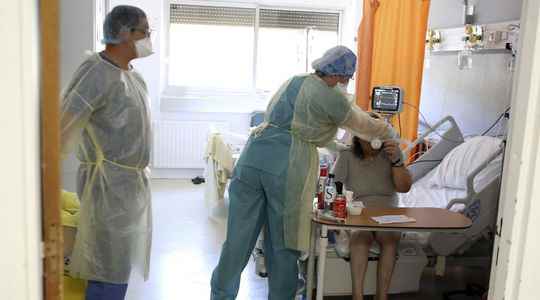Michèle Poirier can breathe. The fear of developing a serious form of Covid-19 is now a part of bad memories. “I feel a lot more liberated… Basically, I almost feel like I’m vaccinated.” At 64, this retiree has been immunocompromised since a double lung transplant in March 2020: she has to take anti-rejection drugs that reduce the effectiveness of her immune system. As a result, the vaccination had no effect on her, even after three doses of vaccine, since no trace of antibodies to protect her from Covid-19 was detected in her body. But since last December, Michèle is more serene: she was able to receive an injection of Evusheld, a treatment based on monoclonal antibodies which artificially replaces the natural immune response.
In France, nearly 300,000 people are said to be immunocompromised and particularly exposed to the coronavirus. “It is estimated that the risk of serious forms in this population is ten times higher than for patients with comorbidities,” explains Philippe Grimbert, head of the nephrology and transplantation department at the CHU Henri Mondor in Créteil. Depending on the severity of this immunosuppression, the protection conferred by the vaccine may prove effective after several doses, but for the majority, this response is insufficient or even non-existent. Laurence Apitz has experienced this. Heart transplant recipient two years ago, this 50-year-old lawyer must take immunosuppressive drugs, and after four doses of vaccine, the finding is discouraging: “I had no antibodies, nothing, zero”, she says. .
If these French men and women remained unprotected for many months, the development of monoclonal antibodies specifically targeting SARS-CoV2 offers an alternative to the vaccine. By injecting them preventively into patients, they make it possible to avoid serious forms of the disease. A first antibody cocktail, Ronapreve, hit the market in September and was offered to people who did not develop a response to vaccination. “This treatment worked well against the Delta variant, but proved to be ineffective with Omicron”, relates Philippe Grimbert. Combined with a highly contagious variant, the drop in efficiency is such that health authorities now recommend no longer injecting these antibodies into immunocompromised patients. “It was a disaster because all of a sudden we find ourselves with patients who are no longer protected at all”, recalls Philippe Grimbert.
Change of treatment
In the past two months, a new drug, Evusheld, has finally become available. These monoclonal antibodies are more resistant to Omicron, and remain sufficiently effective to protect against serious forms. A change that required a good dose of pedagogy: “We had to resume our entire prevention strategy, that is to say re-convene all the people who were treated with Ronaprev, to offer them Evusheld”, details the head of department of Henri Mondor. The newcomer has another advantage since its administration is done in two intramuscular injections carried out every six months. “It’s lighter than Ronaprev, which took a lot of nurses’ time and forced patients to come every month,” notes Pierre Tattevin, head of the infectious diseases and medical resuscitation department at Rennes University Hospital.
For patients who can benefit from them, these treatments are a deliverance. “I know that there will always be a risk with the disease, but at least I am reassured: I should avoid ending up in sheaves”, confides Michèle Poirier. Laurence Aptiz admits having “a little scared” before receiving the injections of Evusheld, because the drug can cause rare cardiac complications, “but it was that or falling into depression because of the isolation, so I I made the risk-benefit balance my way,” she says.
For those who still doubt the value of these treatments, or who hesitate in the face of the risk of complications, doctors must be transparent. “You have to be honest with the patients, there can be cardiac complications, but above all you have to explain that the benefit is to avoid Covid, with all the problems it can cause”, explains Pierre Tattevin.
Different motives
The Evusheld also leaves the hope of being able to be prescribed more widely than Ronapreve since people with a weak response to vaccination can also benefit from it. “This is good news which makes it possible to considerably increase the eligible population”, initially comments Yvanie Caillé, the founder of the Renaloo association, bringing together patients with kidney failure or transplant patients. Before putting things into perspective: “But today with only 2,500 weekly injections, the pace is too low.” According to his calculations, if we continued at such a rate, it would take more than a year to protect all eligible immunocompromised people.
Access to this treatment has greatly improved but the constraints remain strong in hospitals under stress. “We tried to detach certain members of staff in the dedicated teams but we still lack arms”, recognizes Pierre Tattevin, in Rennes. For a few days, Evusheld injections have been possible at home, a flexibility that could improve its use. But challenges still need to be addressed. “From one structure to another, there are different motivations and levels of information of the teams. Above all, concludes Yvanie Caillé, this reluctance creates detrimental inequalities in access to medicines.”
